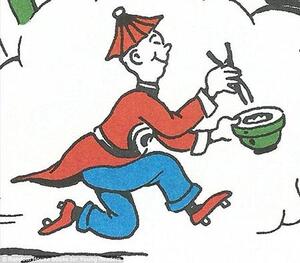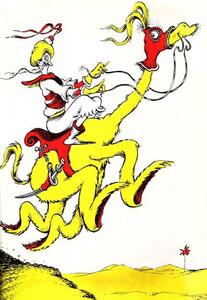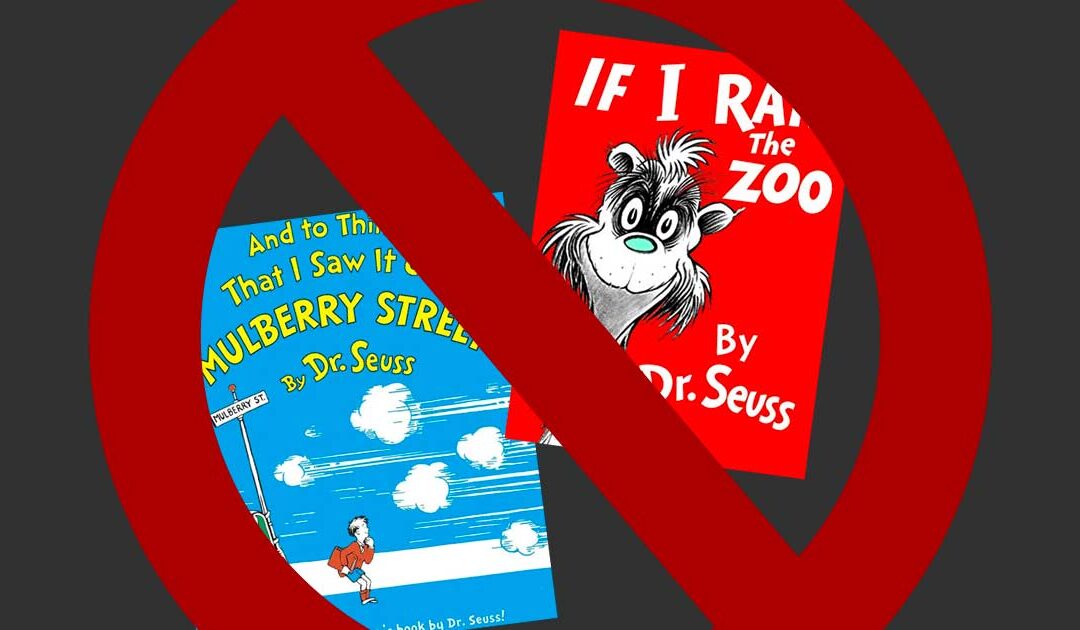Cancel Culture, a phenomenon whose existence (too) many contort themselves into pretzels denying, has “found” the writings of Theodore Geisel. Or, as most of us know him, Dr. Seuss, author of more than 60 books and creator of The Cat In The Hat, Sam-I-Am, The Grinch, The Lorax, Horton the Elephant, and Cindy Lou Who, among countless other characters.
Specifically, Dr. Seuss Enterprises is going to discontinue publishing six titles, “because of racist and insensitive imagery.” This on the heels of the Biden Administration’s rather obvious diss on Read Across America Day, an event “historically connected with Dr. Seuss.”
 Considered strictly on merits, concluding that certain depictions are negatively stereotypical is honest and proper. It is also accurate to note that some of Geisel’s other early work is rankly racist. But, as Reason notes, Seuss grew over time (as did our entire culture since the 40s, when his early war-mentality-infused works emerged), and that early imagery gave way to good and positive messaging.
Considered strictly on merits, concluding that certain depictions are negatively stereotypical is honest and proper. It is also accurate to note that some of Geisel’s other early work is rankly racist. But, as Reason notes, Seuss grew over time (as did our entire culture since the 40s, when his early war-mentality-infused works emerged), and that early imagery gave way to good and positive messaging.
Still, Seuss has been in the social-justice cross hairs for some time, in part because of these old depictions, but also because the books were judged insufficiently diverse (no matter that most of the characters aren’t even human).
So, now, even famous works that aren’t problematic are being dumped into the dustbin of history, judged not on their own merits, but rather with a “fruit of the poisoned tree” genetic fallacy rationalization.
As the editors at National Review suggest, this all seems to have started with the Left’s obsessive desire to cancel Mark Twain’s Huckleberry Finn over its use of the “N” word, despite its obvious anti-racism and anti-slavery message. That episode exposed the shallowness and vapidity of the cancelniks’ jihad, where actual thought is replaced by knee-jerk mob swarming and [vapourous histrionics] over words, context and intent be damned.
Yet it is context that ultimately matters in judging this move against Geisel’s works. Each such cancellation is a nibble at the foundation of our societal premise of liberty. Individually, nibbles don’t really affect much, and individually, a “reasonable” argument can be cobbled together as justification. Yes, Dr. Seuss drawing a stereotypical “Chinaman” offends modern norms. Is a purge the answer? Wouldn’t contextualization be better? Are we not capable of using history to inform and educate our young?
Alas, no. History is routinely ignored, dismissed, or retconned by people who don’t give a flying rat’s patootie about liberty or individual rights or an enlightened society. When they find something not to their liking, they dub it ‘offensive’ and work to deny others access to it. And, when they succeed at taking that nibble out of culture and liberty, they look for the next one.
These societal censors are an insatiable lot, and therein lies the real problem with Dr. Seuss’s cancellation. It won’t end there. They will find something else to cancel next, and when they run out of the most obvious targets, they’ll find more benign things to deem ‘offensive’ and cancel. An obsessed social justice warrior (aren’t they all?) will find problems under every rock and behind every tree. “Racism” is a favorite tool, because it evokes gut-level emotional responses in average folk, and puts those who’d resist censorship and cancelling on the defensive (you are defending racism if you don’t agree with me!!!!). It’s not the only tool, however. The entire foundation of this form of power-seeking (and make no mistake, this is all about power, about establishing dominance over others) is about creating divisions, magnifying them, and exploiting them. It’s cultural Marxism, and it’s a long con, with a time horizon measured in decades.
Nothing has stopped any of us from choosing not to buy or read a book we find problematic. However, a society that encourages public resources like libraries to exclude words because some don’t want others to buy or read them is a society that will lose its soul. Yes, Dr. Seuss Enterprises has the right to publish or not publish whatever it wishes. Yes, Amazon has the right not to sell a particular book or books. Yes, librarians and politicians can choose to highlight or ignore whichever authors they wish.
We as citizens of a nation founded on liberty should, however, criticize them loudly when we witness such censorious behavior, and call then out on their deliberate efforts to erase cultural history.
If we don’t, their nibbles will continue eroding our society until it collapses into an Orwellian nightmare.


how do you draw a person of Asian descent in a cartoon, so that they are easily recognizable as such.
hang a sign around their neck, and I think that would be problematic.
they say the books aren’t diverse enough, but if the drawings of people all looked the same except for skin color they’d probably compain, if you put them in traditional dress again they’d complain.
and let’s not forgetGeisel also authored several books under the pen name Theo. LeSieg (Geisel spelled backward) and one book under the name Rosetta Stone. These books were written but not illustrated by Geisel.
and some as Geisel I believe
I don’t think we serve our defense of liberty well if we ignore or defend problematic stuff. Contextualizing it is what we should be doing, and that includes recognizing the obvious.
I agree you should never defend the problematic.
But do you discard something because of it is problematic. the Disney disclaimer states These stereotypes were wrong then and are wrong now. which always brings up were they wrong then, it takes away motive for what they did.Did they know it was wrong.To go Hyperbolic if a two year old repeats a word that Grand Pa said does that make the child a racist.If you grow up where the depictions of groups of people are a certain way and you were never told that they were wrong, are you wrong to draw them that way yourself, are you wrong.
In the book If I Ran the Zoo the depiction of the Asians and Africans are clearly wrong by today’s standards and maybe even back then (I’m slightly older than you and I don’t remember having these pointed out as wrong in the 60s) Though I will say that the Africans’ depiction was too close to minstrels for even the 50s and 60s.
The Russian with a rifle (probably an assault rifle) and bandelier shouldn’t go unnoticed Maybe I am trying to defend the undefendable, but intent has to play a part in this, and I don’t think we can know Dr. Seuss’s.
Should the books with these depictions in them continue to be published, probably not, though I wonder if they could be edited. I have a Disney book of Brer Rabbit and the Briar Patch where he get into a fight with a glue baby…
When my tinfoil hat slips I wonder if they just want to make room for more WOKE books.